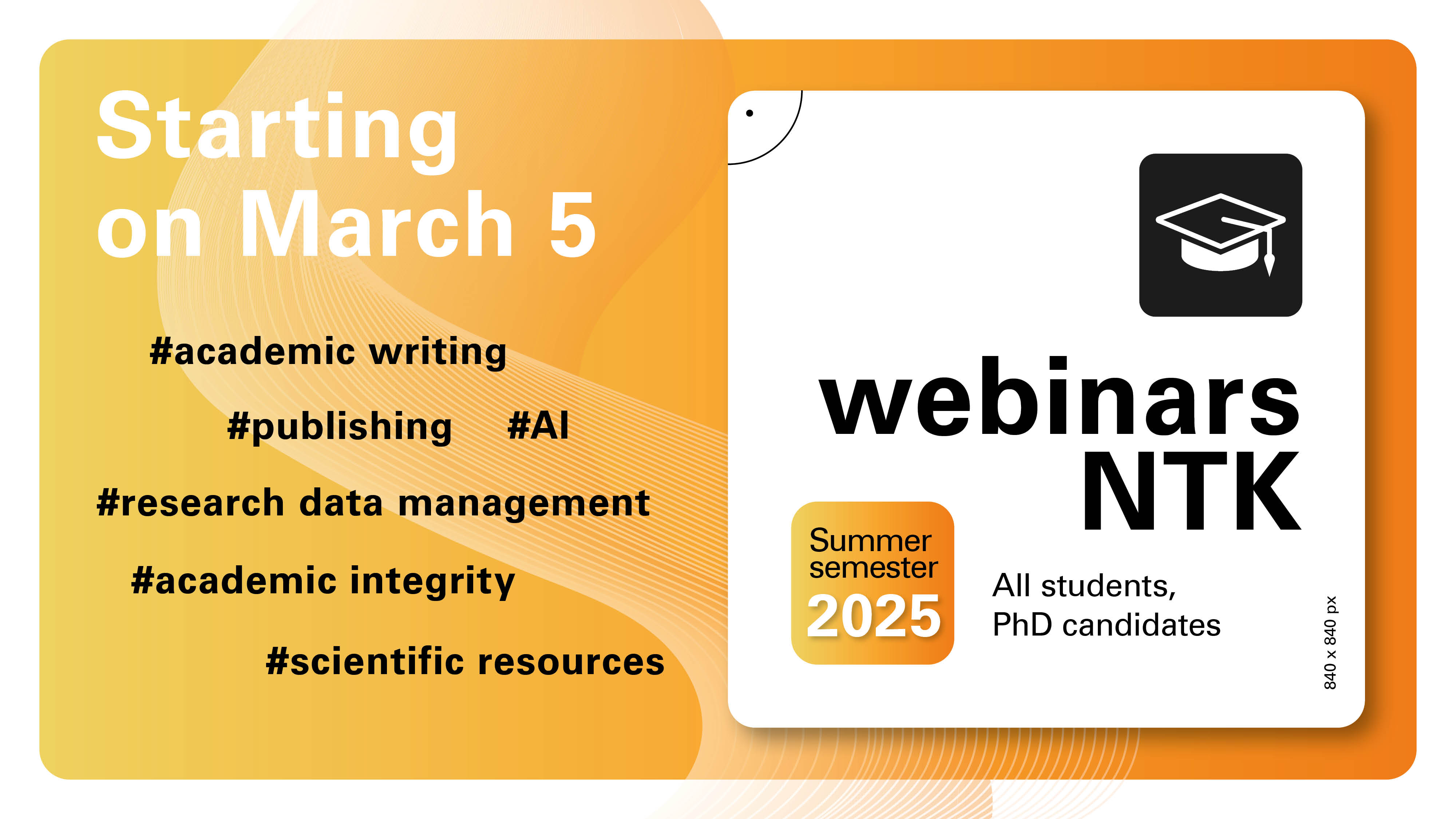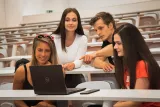With the beginning of the new semester, the National Library of Technology (NTK) in Prague is offering its traditional webinars for doctoral candidates and early career researchers.
These free webinars are held in English and cover a variety of topics in the area of transferable skills, such as navigating academic resources, writing and publishing scientific articles (beginner level), and a basic intro to research data management.
Membership at the NTK is not necessary. However, participants need to sign up online for individual webinars prior to each event:
March 5, 2025, 10:00-11:00 – Navigating Scientific Resources & Staying Organized
March 12, 2025, 10:00-11:00 - AI Essentials for Academia
March 19, 2025, 10:00-11:30 – My First Scientific Article
March 26, 2025, 10:00-11:00 - Academic Integrity
March 2, 2025, 10:00-11:30 – Introduction to Research Data Management
The NTK also offers free consultations geared to specific needs. If you need advice, whether in relation to a dissertation project, conducting a bibliometric analysis, or selecting an appropriate journal for publishing, do not hesitate to make an appointment for an in-person or online consultation.

Dear PhD. students,
Let us inform you about interesting opportunity to join the Shadowing Programme 2024 of a UN staff member:
Shadowing Programme 2024
Want to gain exciting insights into the world of the United Nations in Vienna? A virtual edition of the
Shadowing Programme will take place from 24 October to 24 November 2024. It will offer students the
opportunity to have a one-hour virtual encounter with a UN staff member and join a virtual career workshop.
Staff members from a range of Vienna-based organizations including the following are joining the
Shadowing Programme 2024:
- International Atomic Energy Agency (IAEA) - https://www.iaea.org
- Comprehensive Nuclear-Test-Ban Treaty Organization (CTBTO) https://www.ctbto.org
- United Nations Office on Drugs and Crime (UNODC) - https://www.unodc.org/
- United Nations Environment Programme (UNEP) Vienna Office and Secretariat of the Carpathian
Convention - https://www.unep.org/
- United Nations Office for Disarmament Affairs (UNODA) – https://www.un.org/disarmament/vienna
- United Nations High Commissioner for Refugees (UNHCR) Office in Austria – https://www.unhcr.at
- United Nations Industrial Development Organization (UNIDO) - https://www.unido.org
- United Nations Information Service (UNIS) Vienna - https://www.unis.unvienna.org
- International Commission for the Protection of the Danube River (ICPDR) -
https://www.icpdr.org/main/
- United Nations Liaison Office for Peace and Security in Vienna (UNLOPS Vienna) – UNLOPS
Vienna website
- United Nations Scientific Committee on the Effects of Atomic Radiation (UNSCEAR) -
https://www.unscear.org/
- IOM Vienna Regional Office - https://rovienna.iom.int/
How to participate
Students enrolled in a Master's or PhD programme at universities in the following countries are encouraged
to apply: Armenia, Austria, Azerbaijan, Belarus, Czechia, Georgia, Hungary, Poland, Slovakia,
Slovenia, Türkiye, and Ukraine.
The following information will be needed for your application:
● Name
● Nationality
● Telephone number
● Email address
● University
● Field of study
● Master's or PhD programme
● Field of interest
● Name of the organization you would like to “shadow”
● If selected, what would you expect to get out of the Shadowing Programme? (max. 50 words)
PLEASE NOTE:
The call for application will be open from 16 September until 29 September 2024. You can apply by
sending an email to the entity you wish to shadow. Please note that you can only apply for one entity.
The email addresses of the different UN entities you should send your application to and the latest
information will be published as of 16 September 2024 under the following link on the UNIS website:
Shadowing Programme 2024 (unvienna.org)
There is a limit to the number of applications that can be accepted, so you are encouraged to apply as early
as possible. Incomplete and double applications will not be considered. Furthermore, you might be placed
with a different organization than you indicated, subject to availability of places.
The Shadowing Programme is an opportunity for students to gain insights into the work of a UN staff
member and is not part of any recruitment process.
How to know if you are selected to participate
The selection of students who can participate in the Shadowing Programme will be made after all
registrations have been collected. The successful candidates will be contacted by email.
The Shadowing Programme takes place to help mark United Nations Day (24 October). It is coordinated by
UNIS Vienna and organized in cooperation with all participating Vienna-based organizations.
The United Nations in Vienna
Vienna is one of the four headquarters of the United Nations, along with New York, Geneva and Nairobi.
Since its opening on 23 August 1979 the VIC has become home to several different UN organizations. More
than 5,000 employees from over 125 countries work for the 16 international organizations and units of the
UN in Vienna.
Are you a PhD student or an early-stage researcher looking for some guidance and support in your academic journey? Do you want to improve your skills and learn from experts in various fields? The mentoring programme offers a series of workshops, seminars, and networking opportunities throughout the year, led by experienced mentors and guest speakers that focus on developing professional and personal skills.
In the summer semester 2023/2024, the following workshops will be held for you:
4 March 2024 - Communication and Public Speaking Skills
- Learn how to communicate effectively and confidently in different situations, such as presentations, meetings, interviews, and conferences. You will also get tips and feedback on how to improve your voice, body language, and delivery.
30 April 2024 - AI in Education
- Explore the current and future applications of artificial intelligence in education, such as adaptive learning, personalized feedback, and intelligent tutoring systems. You will also learn about the ethical and social implications of using AI in education, and how to evaluate its impact and potential critically.
27 May 2024 - Time and Priority Management
- Discover how to manage your time and priorities more efficiently and effectively, especially when you have multiple tasks and deadlines.
4 June 2024 - A PhD Student's Guide to the Publishing Galaxy
- Two librarians will try to guide you through the process of publishing an article. From journal selection, through tools to simplify writing, formatting, citation, and proofreading, towards submission for peer review and acceptance. But the mission doesn't end with the published article. Want to show it off and get it on ResearchGate? You can. Want to report it in OBD? You must. We'll show you how to handle different versions of your article. Also look forward to decoding ciphers like decile, quartile, token, ORCID, OBD, APC, hybrid, gold, WoS, FORD, and AIS.
7 June 2024 - Scientific Writing
- Improve your writing skills and style for scientific papers, reports, proposals, and dissertations. You will also learn how to structure your arguments, use appropriate language and tone, etc.
You can find more information and registration forms for particular
workshops here.
We invite those who are interested in mentoring to the INTRODUCTORY WORKSHOP which will take place on 1 November 2023 at 13:00 in the Laborka bistro. The workshop will be held in English and it can help you to indentify your needs, focus on fields you want to develop or find the right mentor.
The moderator is Mgr. Kateřina Cidlinská, Ph.D. and the special guests are doc. Ing. Petr Doležel, Ph.D. (Vice-Rector for Research and mentor) and Ing. Kateřina Knotková, Ph.D. (mentor and former mentee).
Date and time: 1 November 2023 at 1 p.m
Venue: Laborka bistro (Faculty of Chemical Technology, ground floor of building HA)
Registration/application form: https://forms.office.com/e/YUfjKARpXD
More information about the Mentoring Programme at UPCE can be found on this website.
If you have any questions, feel free to contact jana.kremenakova@upce.cz.
We look forward to meeting you!

You might wonder what it is about mentoring that could possibly be so interesting. The more experienced ones give advice to the less experienced. So?
But you might actually be surprised what kind of situations occured during the first year of our mentoring programme, what realizations the mentors came to during their work, how much the mentees as well as the mentors themselves benefited.
It has turned out that bringing people from different fields of expertise, different faculties and departments together can be very beneficial. The mentors all agree it was enriching. Mind you, these are the MENTORS! Although it was expected that the mentees would benefit from the mentoring, it is becoming obvious that mentoring also has a positive impact on the other one of the mentoring pair.
In some cases peer mentoring worked well too – this had certainly already existed at the faculties before an official mentoring programme was introduced. Still, despite frequent promotional activities, not many people are aware of it, which is a shame. Inspite of having his own mentor, a young doctoral student preferred to follow advice of his older fellow students and colleagues when it came to solving practical matters of his doctoral study. “I just go next door and they help me straight away.“ With the mentor he was discussing the possibilities of work internships abroad, the mentor provided him with contacts to foreign universities and companies in his field.
Peer mentoring, where a little more experienced peers provide advice to younger beginning scientists, is very effective and natural. It is therefore good for it to become more widespread at the university.
One of the observations the first year mentors made was how difficult it was to formulate an accurate and apt answer to some questions of their younger colleagues, for example concerning the matters of science and ethics, without due delay. They had to let the answer mature and come back to it during their next meeting. It turns out this is an issue which the scientific community at the university should pay much more attention.
Thanks to mentoring the mentors had the opportunity to get insight into the way of work and life in other parts of the university and other fields of expertise. The pilot cycle of the mentoring programme was also joined by mentees who had already been using mentoring informally before. They entered the mentoring programme because they wanted to belong to the mentoring community, share experience with other colleagues.
It was also interesting to see how the mentoring pairs were matched and what made the mentees choose their mentors.
In some cases it was just the possibility of getting a different view of a person from another field. For instance, a mentee from the Faculty of Restoration chose a mentor from the Faculty of Chemical Technology. Their specializations were very different, but that is not an obstacle when the aim of the mentoring is sharing experience with team management and publishing scientific articles. The mentoring contact between the Faculty of Restoration and the Faculty of Chemical Technology eventually lead to establishing scientific cooperation. Thanks to more effective sharing of information the FCHt helped with chacacterization of materials, which was something the colleague from the Faculty of Restoration used to have done abroad as she had not had any idea that a workplace at her home institution could do the same for her. These can also be fruits of mentoring.
Another time the choice of the mentor was lead by the need to ask an older colleague how to teach, how to prepare for lessons, how to deal with a group of students etc. This is an issue which perhaps poses a problem for more young postdocs who are starting with lecturing. They do not want to ask for help, however, or maybe are ashamed to.
In another case the mentee chose her mentor because she had been interested in a certain experimental method and wanted to learn how to run tests on a particular machine. Hence, the mentoring started with the mentor teaching the mentee how to operate this machine. In the first phase the mentee learned how to work with the machine using already verified samples. Now she has just undergone an internship in Germany and she is coming back with samples which she will be testing „for real“ at the Faculty of Chemical Technology with her own mentor.
One of the reasons for selecting a mentor can also be his/her origin. We could see such case during the pilot cycle of the mentoring programme as well. The mentee chose a foreign mentor from a different cultural background, which enabled her to see a different way of thinking and broaden her horizons so she would not withdraw into her “department shell“. She found her mentor`s advice especially useful when travelling to a conference abroad.
Once you have children, doctoral study becomes more complicated. The importance of time management and the need to focus significantly increase. Yes, we all know it is a matter of priorities. But a sick child can change your priorities quite quickly. When and how then can you deal with all the work that writing dissertation thesis involves? How do the others do it - the people who have already been in such situation and managed to get through it? It is important to choose the mentor carefully – rather a female mentor in this case. Our mentee from the Faculty of Arts and Philosophy did just that. She found herself a mentor from the Faculty of Chemical Technology – a mother of three, who is currently working on her habilitation thesis and the related tasks. She is perfect proof it can be done. Due to the different specialization of the mentor and mentee not all kinds of advice could be applied, but a lot of tips helped the mentee and she made a big progress in her work.
The same mentor has pointed out an interesting thing. She noticed that doctoral students from different fields worked in different types of environments. In humanities the students are completely free when it comes to scientific work, but they are isolated in their work, having to find their own way. In technical and natural sciences the students work in laboratories, in a community where they share information and support each other, they are involved in projects, but they have to comply more with the research of their supervisor. The mentor also appreciates that mentoring contributes to bringing people in the academic community on different levels from students to professors closer together. She drew attention to the fact that many doctoral students lack a “career development plan“, i.e. a plan of a future academic or even non-academic career.
Following are further examples of interesting situations and experience from the mentoring programme:
Not every doctoral student actually expects to stay at the university. They want to join the industry and find a career in a company or in the public sphere. Some mentees were choosing their mentors with this idea in mind.
Sometimes it happens that a student changes his/her specialization after starting the doctoral study. One mentee asked the mentor for advice in this case and the mentor turned out to be a great help in this matter.
At the Faculty of Health Studies a foreign mentee seemed to be enthusiastic about everything on offer – visiting a specialized workplace in the hospital, attending Czech language courses, article proofreading, but in the end she had not used many of these opportunities or fulfilled many of her duties before she returned home to India. The mentor, however, still saw the possibility of mentoring a person from a different cultural background as a great benefit and he plans to continue mentoring foreigners in the future.
The situation of foreign students is usually quite specific. They tend to need help with organizing things related to their stay in our country. Even with such matters the mentors or peer mentors helped sometimes.
As many mentors have experience from abroad, they made a lot of interesting observations based on that. For example one mentor saw at a university in Switzerland that whenever a new colleague came to a faculty, all academic employees received an email with basic information about the newcomer. They also used a “marketplace“ , a group e-mail discussing matters such as “does anybody have this, does anybody work on that“, etc. This helped everyone to be better informed and opened opportunities for cooperation. Being poorly informed and not having a good enough idea of all the possibilities offered by the university was mentioned by most of the doctoral students during their interviews. This problem exceeds the possibilities of mentoring, however.
One rule to remember when it comes to mentoring is that the mentee is not obliged to follow the mentor`s advice. On the other hand, a piece of advice coming from a doctoral thesis supervisor cannot be so easily dismissed.
On top of the mentoring between the mentor and the mentee, the mentoring programme also offered educational seminars. During the “Project Management“ seminar young scientists learned about the university project department, which can provide them with support when they apply for research funding, it can advise them where they can apply for funding, what is and is not realistic, or how to write more challenging project proposals and win a bigger grant. The attendants went through a two-day training of presentation skills, seminar of how to write articles in English (“Writing for Publication in English for Czech Academics and Researchers“), the university library prepared a seminar “How to Write Scientific Articles, Open Access“, which was followed by a seminar of Professor Roman Bulánek called “The Dangers of Publication Practice – Useful Things to Know“ devoted to ethics in scientific work and publishing scientific work results. The last seminar this year was a seminar called “Learning Research Ethics Promotes Scientific Integrity“. It was lead by Carlos Melo from Charles University in Prague and looked at ethics in scientific work and scientific environment from a more general point of view.
Students and young scientists also had an opportunity to take part in three workshops. Two at the beginning of the mentoring programme pilot year, the last one at the end of the year when the second year was being promoted.
All these group activities were attended by 189 people.
We are very pleased that in the pilot year of the mentoring programme we managed to match mentoring pairs from different backgrounds – people from different faculties, countries, in a few cases also from other universities – and that there was peer mentoring too. Thanks to that we were able to test a whole range of different forms of mentoring. The mentoring programme was realized by 17 couples with the participation of 12 mentors and everything was complemented by group education. The pilot cycle has clearly shown that the goals of the mentoring programme can be achieved – effective sharing of experience and advice, looking at certain problems from different, fresh perspective, thinking outside the box, improving awareness and facilitating open discussion, just as helping students get rid of their fear of asking for help and advice. It has proved mentoring is one of the paths we need to follow.
In the end, most of the mentors came to a conclusion that thanks to mentoring they think about other people differently, they have a good feeling from helping and passing their experience onto younger colleagues, it makes them happy to see when a student or a young colleague manages to succeed in something.
According to the mentors an important presumption for a successful mentoring is mutual trust and respect.
For their experience sharing and their time devoted to younger colleagues and students we are very grateful to all the mentors and we hope they will continue with mentoring in the future.
Mentoring Programme Team of the University of Pardubice




